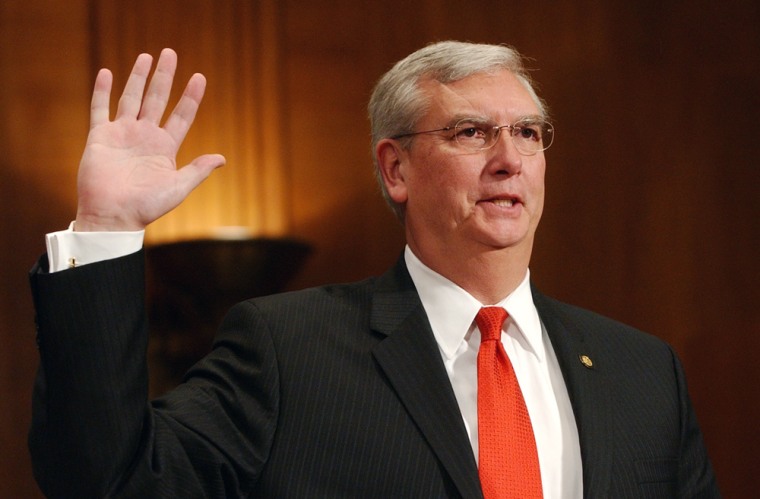The chair of the Senate environment committee on Thursday accused the EPA chief of representing "special interests" instead of protecting the environment when he denied California's request to enact greenhouse gas rules on vehicles.
"You're going against your own agency's mission and you're fulfilling the mission of some special interests," Sen. Barbara Boxer, D-Calif., told Environmental Protection Agency Administrator Stephen Johnson at the start of a hearing on the waiver request.
California and several other states seeking the same flexibility in dealing with emissions tied to global warming sued the Environmental Protection Agency after the decision last month.
"You're walking the American taxpayers into a lawsuit that you're going to lose," Boxer said of Johnson's decision, which has the backing of the automotive industry and most Republican lawmakers.
Other Democrats on the committee voiced similar anger with the EPA chief.
Johnson responded that he is "bound by the criteria in the Clean Air Act, not people's opinions."
"The Clean Air Act does not require me to rubberstamp waiver decisions," Johnson added. "It was my conclusion that California didn't meet the criteria, or at least all of the criteria."
Johnson: Not just California issue
The EPA granted California other waivers when the issue was regional in nature, Johnson said, but that's not the case with a global pollutant like carbon dioxide. In his opening statement, Johnson reiterated what he wrote to California Gov. Arnold Schwarzenegger in denying the waiver: This challenge “is not exclusive or unique to California," he stated.
The denial was the first ever by the EPA on a state's waiver request, but Johnson said that was understandable given it was the first time greenhouse gases were at the heart of a request.
Johnson also disputed Democratic suggestions that his decision was made under political pressure from the White House. "I was not directed by anyone to make the decision, this was my decision," he insisted.
California needs a federal waiver under the Clean Air Act to implement its first-in-the-nation tailpipe law, which would force automakers to cut greenhouse gas emissions by 30 percent in new cars and light trucks by 2016.
If California got the waiver other states could then impose the same rules. Twelve other states have already adopted them — Connecticut, Maine, Maryland, Massachusetts, New Jersey, New Mexico, New York, Oregon, Pennsylvania, Rhode Island, Vermont, and Washington — with others preparing to do so.
Johnson reiterated his position that it is better to have a single national standard for greenhouse gas emissions than different standards in different states. Congress' newly passed fuel efficiency law, signed by President Bush last month, provides such a national standard, he said.
Prefers 'uniform national standards'
"I believe that it is preferable, as a matter of policy, to have uniform national standards to address fuel economy issues across the entire fleet ," Johnson said in his opening statement.
Environmentalists contend that California's law is much stronger and takes effect much faster than the new federal rules.
Sen. James Inhofe, R-Okla., came to Johnson's aid at the hearing, siding with him on the waiver denial.
"The fact is that California politicians are trying to achieve through this waiver provision something they cannot achieve through federal legislation — even tighter fuel economy standards than what Congress passed," he said in his opening statement.
Inhofe said California's proposed rules would cost jobs in the automotive industry across the country, including his state.
Boxer: 'You cannot assert privilege'
Boxer, for her part, reiterated her demand that Johnson disclose more documentation that went into his decision-making.
Johnson said the pending lawsuit precluded the agency from doing so.
"You have no privilege vis a vis the Congress," she said. "You cannot assert privilege."
"To make it so hard for us to get those documents is just extraordinary," she added.
Some documents released by the EPA and disclosed by Boxer's office on Wednesday showed that EPA staff advised Johnson that California had "compelling and extraordinary conditions" to justify a federal waiver.
